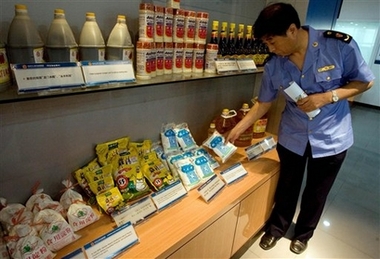Official: Food safety issues under control
(Agencies/chinadaily.com.cn)Updated: 2007-06-13 08:51
BEIJING - The food safety problems were not as bad as reported and the authorities were enforcing safety protections and supervisions, a senior Chinese official said Tuesday.
China has developed "very good, very complete methods" to regulate product safety, Li said.
China's poor safety record has increasingly come under scrutiny as its goods make their way to global markets. Major buyers such as the United States, Japan, and the European Union have pushed for Beijing to improve inspections.
The pressure has increased in recent months as US inspectors have banned or turned away Chinese exports including wheat gluten tainted with the chemical melamine, reportedly blamed for dog and cat deaths in North America.
The US Food and Drug Administration has also stopped all imports of Chinese toothpaste to test for a deadly chemical reportedly found in tubes sold in Australia, the Dominican Republic and Panama.
In response, Chinese safety officials have urged better surveillance at all levels and promised to set up a food recall system, the country's first, by year end.
"We are very concerned about food safety in China," Li said. "But we do not want to cause panic among the people."
"There is now largely no problem with food safety," Li said.
At the Beijing food lab, technicians wearing white coats tested packages of spring rolls, dumplings and other frozen foods for toxic chemicals.
In another room, a variety of fake products were displayed including Wrigley's chewing gum, Shiseido skin care products and Levi's jeans.
Li said government food safety procedures include a hot line set up in 1999 that has grown into a surveillance network of local groups and government bodies.
Local industry and commerce authorities have conducted widespread inspections of department stores, supermarkets, outdoor markets and wholesale markets, the State Council, China's Cabinet, said in a statement.
It said 4.6 million inquires, complaints and reports were received last year from consumers and 16,000 tons of unsafe food products were ordered withdrawn from the market in 2006. It did not give details of the products or why they were withdrawn.
The statement said the surveillance network has also expanded to focus on consumer protection, trademark protection, food safety supervision and advertising regulations.
|
||
|
||
|
|

